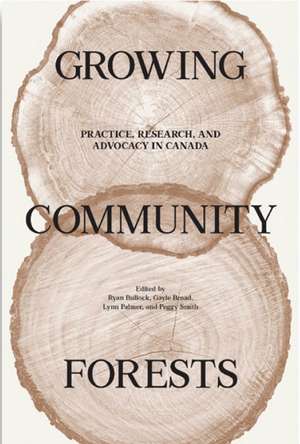Growing Community Forests: Practice, Research, and Advocacy in Canada
Editat de Ryan Bullock, Gayle Broad, Lynn Palmer, Peggy Smithen Limba Engleză Paperback – 9 oct 2017
Canada is experiencing an unparalleled crisis involving forests and communities across the country. While municipalities, policy makers, and industry leaders acknowledge common challenges such as an overdependence on US markets, rising energy costs, and lack of diversification, no common set of solutions has been developed and implemented. Ongoing and at times contentious public debate has revealed an appetite and need for a fundamental rethinking of the relationships that link our communities, governments, industrial partners, and forests towards a more sustainable future.
The creation of community forests is one path that promises to build resilience in forest communities and ecosystems. This model provides local control over common forest lands in order to activate resource development opportunities, benefits, and social responsibilities. Implementing community forestry in practice has proven to be a complex task, however: there are no road maps or well-developed and widely-tested models for community forestry in Canada. But in settings where community forests have taken hold, there is a rich and growing body of experience to draw on.
The contributors to Growing Community Forests include leading researchers, practitioners, Indigenous representatives, government representatives, local advocates, and students who are actively engaged in sharing experiences, resources, and tools of significance to forest resource communities, policy makers and industry.
The creation of community forests is one path that promises to build resilience in forest communities and ecosystems. This model provides local control over common forest lands in order to activate resource development opportunities, benefits, and social responsibilities. Implementing community forestry in practice has proven to be a complex task, however: there are no road maps or well-developed and widely-tested models for community forestry in Canada. But in settings where community forests have taken hold, there is a rich and growing body of experience to draw on.
The contributors to Growing Community Forests include leading researchers, practitioners, Indigenous representatives, government representatives, local advocates, and students who are actively engaged in sharing experiences, resources, and tools of significance to forest resource communities, policy makers and industry.
Preț: 179.27 lei
Nou
Puncte Express: 269
Preț estimativ în valută:
34.30€ • 35.82$ • 28.33£
34.30€ • 35.82$ • 28.33£
Carte disponibilă
Livrare economică 25 martie-08 aprilie
Preluare comenzi: 021 569.72.76
Specificații
ISBN-13: 9780887557934
ISBN-10: 0887557937
Pagini: 232
Ilustrații: yes
Dimensiuni: 152 x 229 x 18 mm
Greutate: 0.36 kg
Ediția:1
Editura: University of Manitoba Press
Colecția University of Manitoba Press
ISBN-10: 0887557937
Pagini: 232
Ilustrații: yes
Dimensiuni: 152 x 229 x 18 mm
Greutate: 0.36 kg
Ediția:1
Editura: University of Manitoba Press
Colecția University of Manitoba Press
Recenzii
“Rural and small-town resource-dependent regions are struggling with transformation and change in the new economy. The expansion of community forest initiatives over the past decades have been one mechanism by which local goals and values can be linked to the use of a community’s forested surroundings. Within a growing literature, this book is a welcome, diverse, and timely addition which provides a ready and valuable reference to community forests and community forestry in Canada.”
– Greg Halseth, Geography, University of Northern British Columbia
– Greg Halseth, Geography, University of Northern British Columbia
Notă biografică
Ryan Bullock is an Assistant Professor in the Department of Environmental Studies and Sciences and Director of the Centre for Forest Interdisciplinary Research at the University of Winnipeg.
Gayle Broad is an Associate Professor in the Community Economic and Social Development program and Director of Research at the NORDIK Institute at Algoma University.
Lynn Palmer is a PhD candidate in the Faculty of Natural Resources Management at Lakehead University.
Peggy Smith is an Associate Professor in the Faculty of Natural Resources Management and the Interim Vice Provost (Aboriginal Initiatives) at Lakehead University.
Gayle Broad is an Associate Professor in the Community Economic and Social Development program and Director of Research at the NORDIK Institute at Algoma University.
Lynn Palmer is a PhD candidate in the Faculty of Natural Resources Management at Lakehead University.
Peggy Smith is an Associate Professor in the Faculty of Natural Resources Management and the Interim Vice Provost (Aboriginal Initiatives) at Lakehead University.








